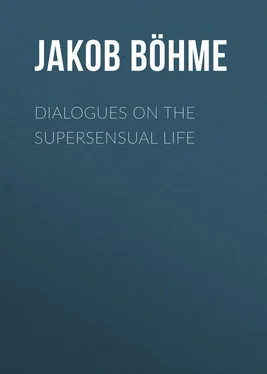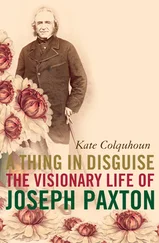Jakob Böhme - Dialogues on the Supersensual Life
Здесь есть возможность читать онлайн «Jakob Böhme - Dialogues on the Supersensual Life» — ознакомительный отрывок электронной книги совершенно бесплатно, а после прочтения отрывка купить полную версию. В некоторых случаях можно слушать аудио, скачать через торрент в формате fb2 и присутствует краткое содержание. ISBN: , Жанр: foreign_antique, foreign_prose, на английском языке. Описание произведения, (предисловие) а так же отзывы посетителей доступны на портале библиотеки ЛибКат.
- Название:Dialogues on the Supersensual Life
- Автор:
- Жанр:
- Год:неизвестен
- ISBN:http://www.gutenberg.org/ebooks/33742
- Рейтинг книги:4 / 5. Голосов: 1
-
Избранное:Добавить в избранное
- Отзывы:
-
Ваша оценка:
- 80
- 1
- 2
- 3
- 4
- 5
Dialogues on the Supersensual Life: краткое содержание, описание и аннотация
Предлагаем к чтению аннотацию, описание, краткое содержание или предисловие (зависит от того, что написал сам автор книги «Dialogues on the Supersensual Life»). Если вы не нашли необходимую информацию о книге — напишите в комментариях, мы постараемся отыскать её.
Dialogues on the Supersensual Life — читать онлайн ознакомительный отрывок
Ниже представлен текст книги, разбитый по страницам. Система сохранения места последней прочитанной страницы, позволяет с удобством читать онлайн бесплатно книгу «Dialogues on the Supersensual Life», без необходимости каждый раз заново искать на чём Вы остановились. Поставьте закладку, и сможете в любой момент перейти на страницу, на которой закончили чтение.
Интервал:
Закладка:
Jacob Behmen's mode of expression is all his own, and there is much in the fabric of his thought which men of our time, if they take a superficial view, would not find it easy to accept. The doctrine of Evolution now profoundly influences every corner of the field of thought. We now incline to think rather of the rise of Man out of Nature than of his fall into it, though, perhaps, there can no more be a rise without a precedent fall, than there can be a return without a precedent out-going. Evolution may be the time-form of Attraction. But all this affects the outside form, not the essence of the doctrine. Behmen is concerned with the real nature of things, apart from time and space, with their apparent, but so misleading, facts. He appeals to each Soul's knowledge of itself, and, on the principle that all is in everything , draws from the nature of Man, that little Universe (and we can no otherwise learn things as they are in themselves), his teaching as to Universal Nature. "In Man (he says) lies all whatsoever the Sun shines upon, or Heaven contains, as also Hell and all the Deeps." His Iliad is the struggle between light and darkness, life and death, expansion and contraction, the centripetal and centrifugal force, heat and cold, love and hatred, peace and wrath, humility and pride, self-sacrifice and self-seeking, joy and anguish, repose and restlessness, in the whole of Nature and in the Soul of Man. Does not every man, who has lived his full life, know the truth and reality of all this? It is known more especially and actually by those ardent and adventurous spirits who have sailed in far seas of thought or action, not merely coasting along the shores of tradition, authority and established rule. Sinners know some things more vividly[Pg xxxiii] than those who ever and easily have been good. Only the man who has been sick knows the difference between sickness and health. The prodigal who had wandered in a far country and had lived as he would, understood the meaning of peace and love better than the brother who had always stayed at home.
These wanderers, if they return in time, know best, taught by the heart-rending lessons of experience, the difference between the Heaven and Hell within them; the Hell of wrath, self-torment, fear, anxiety, envy, malice, evil-will, pride, cruelty, sensual passion, longing to domineer, and the Heaven of love, benevolence, meekness, humility, compassion, peace, joy, long-suffering.
They know that Heaven and Hell can alike be revealed in the Soul. From youth they have felt something in them striving, often feebly enough, against passionate desires for wealth, honour, success, and for mastery over the minds, affections, and bodies of others. Behind all this turmoil and ever unsatisfied anguish of seeking that which satisfies not, they have been aware of a diviner life slowly growing towards heaven, ever and again thwarted and driven back by the renewed assaults of the Spirit of the World, yet never quite destroyed. At the moments of fiercest fight against rebel passions they have felt the divine assisting strength flow into them, if only they powerfully invoked it, turning towards its source as a babe towards its mother's breast. They have heard the "Peace be still" amid the wildest spiritual storms. They know that if they have been saved, it is not by their own strength nor by reasoning, but by this power from without.
They know the impotence, in action, of the merely reflective or spectator faculty. In this sense of the word "reason," they would agree with him who wrote "Your Heart is the best and greatest gift of God to you; it is the highest, greatest, strongest, and noblest Power of your Nature; it forms your whole Life, be it what it will; all Evil and all Good comes from it; your Heart alone has the key of Life and Death; it does all that it will; Reason is but its plaything; and whether in Time or Eternity, can only be a mere Beholder of the wonders of happiness, or forms of misery, which the right or wrong working of the Heart is entered into." 7 7 Law's Works, vol. vii., p. 162.
William Law remarks that Jesus Christ, though he had all wisdom, yet gives but a small number of doctrines to mankind "whilst every moral teacher writes volumes upon every single virtue." It is, he adds, because our Lord "knew what they know not, that our whole malady lies in this, that the Will of our Mind is turned into this World, and that nothing can relieve us, or set us right, but the turning of the Will of our Mind and the Desire of our Hearts to God. And hence it is that he calls us to nothing but a total denial of ourselves and the Life of this World and to faith in him as the Worker of a new birth and life in us." On this one root of the whole matter Jacob Behmen insisted, expressing one truth in a thousand ways and through images, which to him are not images but the same process working in other spheres. His whole practical, moral teaching enforces the right direction of Desire. Mali mores sunt mali amores , said one who also truly saw ; the profound Augustine. The hunger of the Soul must be turned to the source of eternal joy. All that is good and beautiful in nature or in the heart of man flows from that fountain. Desire is everything in Nature; does everything. Heaven is Nature filled with divine Life attracted by Desire.
PRELIMINARY NOTE
Before entering upon the Dialogues I have thought it well to insert some sentences taken from a treatise of Behmen's called "Regeneration," together with some taken from another treatise of his on "Christ's Testament" because they show well the spirit in which he thought and wrote. The freedom of thought and expression which he claims is, happily, far more readily accorded now than it was in his own day.
I have only one thing to add. In the eighteenth century English translation of Behmen's Works, all the substantives, as was then the frequent custom, are printed with capital letters. There is a philosophic basis for this practice, because a substantive is an attempt to denote a "thing in itself" and is therefore of greater weight than an adjective, which only expresses qualities which we attribute to it. To Behmen's Works this mode of printing seems especially appropriate. In our now too literary language, many words have become so trite and carelessly[Pg xxxviii] used that they have almost ceased to have reference to real existing things. But Behmen never uses words in this merely literary way, being indeed in nowise a man of letters. It might have been said of him, as indeed his enemies did at the time say, that which was said by the Jews of our Lord, "How knoweth this man letters having never learned?" When he speaks of the " glory " of God, he means something as real as if he spoke of the " leaves on that tree," and so with all his words. I was therefore somewhat inclined, in order to mark this, to adhere altogether to the old custom in this case, and though I have not done so, fearing it might annoy the eye of the unaccustomed reader, I have preserved the capital letters in many cases, where it is especially desirable to dwell on the expression of real existences by the words. It is of course an illogical compromise between two customs.
The title "Supersensual Life" is not altogether a good one, but it is that which is used in former editions of Behmen. The idea is rather of Life behind, than above, the life of sense.
A true Christian, who is born anew of the Spirit of Christ, is in the simplicity of Christ, and hath no strife or contention with any man about religion.
The Christendom that is in Babel striveth about the manner how men ought to serve God and glorify him; also, how they are to know him, and what he is in his Essence and Will. And they preach positively that whosoever is not one and the same with them in every particular of knowledge and opinion, is no Christian, but a heretic.
Читать дальшеИнтервал:
Закладка:
Похожие книги на «Dialogues on the Supersensual Life»
Представляем Вашему вниманию похожие книги на «Dialogues on the Supersensual Life» списком для выбора. Мы отобрали схожую по названию и смыслу литературу в надежде предоставить читателям больше вариантов отыскать новые, интересные, ещё непрочитанные произведения.
Обсуждение, отзывы о книге «Dialogues on the Supersensual Life» и просто собственные мнения читателей. Оставьте ваши комментарии, напишите, что Вы думаете о произведении, его смысле или главных героях. Укажите что конкретно понравилось, а что нет, и почему Вы так считаете.












